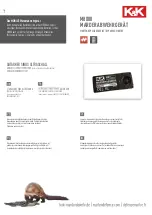
Detailed description
2.12 Block descriptions
Basic logic functions: PLC basic program solution line (P3 sl)
Function Manual, 11/2006, 6FC5397-0BP10-2BA0
177
CALL FC 10 (
//Error and operational messages
ToUserIF :=
TRUE,
//Signals transferred from DB2
//to interface
Ack :=
I6.1);
//Acknowledgment of error messages
//via I 6.1
END_ORGANIZATION_BLOCK
2.12.12
FC 3: GP_PRAL Basic program, interruptdriven section
Description of Functions
Blocksynchronized transfers from the NCK to the PLC (auxiliary and G functions) are carried
out in the interruptdriven part of the basic program. Auxiliary functions are subdivided into
normal and highspeed auxiliary functions.
Highspeed auxiliary functions
•
The highspeed functions of an NC block are buffered and the transfer acknowledged to
the NC. These are passed to the application interface at the start of the next OB1 cycle.
•
Highspeed auxiliary functions programmed immediately one after the other, are not lost
for the user program. This is ensured by a mechanism in the basic program.
Normal auxiliary functions
are acknowledge to the NC only after one completed cycle duration. This allows the
application to issue a read disable to the NC.
The G Functions are evaluated immediately and passed to the application interface.
NC process interrupts
If the interrupt is triggered by the NC (possible in each IPO cycle), a bit in the local data of
OB 40 ("GP_IRFromNCK") is set by the basic program, when the FB 1 parameter "UserIR":
= TRUE"). This data is not set on other events (process interrupts through I/Os). This
information makes it possible to branch into the associated interrupt routine in the user
program in order to initiate the necessary action.
To be able to implement highspeed, jobdriven processing of the user program for the
machine, the following NC functions are available in the interrupt processing routine (OB 40
program section) for the PLC user program:
•
Selected auxiliary functions
•
Tool-change function for tool-management option
•
Position reached for positioning axes, indexing axes and spindles with activation via PLC
The functions listed above can or must be evaluated by the user program in OB 40 in order
to initiate reactions on the machine. As an example, the revolver switching mechanism can
be activated when a T command is programmed on a turning machine.
For further details on programming hardware interrupts (time delay, interruptibility, etc.) refer
to the corresponding SIMATIC documentation.
Summary of Contents for SINUMERIK 840D sl
Page 282: ...Index Basic logic functions Acceleration B2 64 Function Manual 11 2006 6FC5397 0BP10 2BA0 ...
Page 388: ...Basic logic functions Travel to fixed stop F1 Function Manual 11 2006 6FC5397 0BP10 2BA0 52 ...
Page 962: ...Index Basic logic functions Emergency Stop N2 20 Function Manual 11 2006 6FC5397 0BP10 2BA0 ...
Page 1704: ...Constraints Basic logic functions Spindles S1 94 Function Manual 11 2006 6FC5397 0BP10 2BA0 ...
Page 1716: ...Index Basic logic functions Spindles S1 106 Function Manual 11 2006 6FC5397 0BP10 2BA0 ...
Page 1996: ...Index Basic logic functions Tool Offset W1 208 Function Manual 11 2006 6FC5397 0BP10 2BA0 ...
Page 2150: ...Table of contents Basic logic functions Appendix 4 Function Manual 11 2006 6FC5397 0BP10 2BA0 ...
Page 2184: ...Glossary Basic logic functions Appendix 38 Function Manual 11 2006 6FC5397 0BP10 2BA0 ...
















































